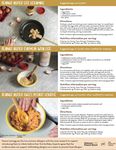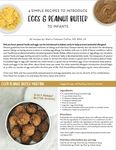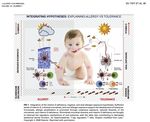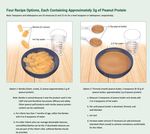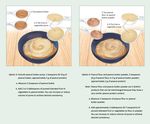Preventing Food Allergies: The Impact of What and When We Feed Babies - Presented by: Sherry Coleman Collins, MS, RDN, LD - Food Allergy ...
←
→
Page content transcription
If your browser does not render page correctly, please read the page content below
Preventing Food Allergies: The Impact of What and When We Feed Babies Presented by: Sherry Coleman Collins, MS, RDN, LD
Disclosure • Consultant: National Peanut Board
• Consultant: Mission Mighty Me
• President/CEO: Southern Fried Nutrition
Services, LLC• Explain why there have been changes to the
recommendations for feeding infants potential
allergens
• Utilize the latest research and evidence-based
guidelines to recommend what potentially
Objectives allergenic foods to incorporate into infant diets
and when to incorporate those foods
• Provide practical recommendations and
resources for clients, parents and caregivers to
easily facilitate the early introduction of
potential allergensQuick History of Feeding Guidelines
AAP
recommended
avoiding the NIAID Guidelines for
top allergens the Diagnosis and NIAID
for 1, 2 or 3 Management of Food Addendum to
years Allergies the Guidelines
2000 2008 2010 2015 2017 2019
Rescinded guidance AAP Revised Report
Consensus
on avoidance, stating The Effects of Early
Report Nutritional
that the research
Interventions on the
doesn’t support Development of
avoidance as a way to Atopic Disease in
prevent allergies, Infants and Children
“more research is
needed”Learning Early About
Peanut allergy (LEAP)
•640 infants at high-risk for peanut allergy d/t
egg allergy or mod/severe eczema
•Half ate peanut foods at 4-11 months
•Half avoided
•Up to 86% reduction in peanut allergy at the
end of 5 years
•Early introduction is safe and effective
http://www.nejm.org/doi/full/10.1056/NEJMoa1414850#t=articleDual Exposure Hypothesis
PETIT Trial
• Two step introduction of egg to 147 high-risk (eczema)
infants
• Used heated egg white powder
• 50mg/day at 6 months-9 months
• 250mg/day 9months-12 months
• Stopped early because it so successfully reduced egg
allergyEnquiring About Tolerance (EAT)
Recruited breastfed infants for early Outcomes:
intro of 6 foods • Difficult to adhere to protocol
• Milk
• Decreased food allergies overall
• Egg in the EAT babies
• Peanut
• Decreased peanut and egg
• Wheat allergy in per protocol when 2g
• Sesame protein per week or more each
• Fish was eaten
http://www.jacionline.org/article/S0091-6749(16)00135-4/abstractChild Study
Study design Results
• N=2669 birth through 3
years “General-population infants
introduced to peanut after age
• Population cohort study 12 months were more likely to
• Compared rates of have sensitization and
sensitization to peanut, probable clinical allergy to
egg, and milk among those peanut at 3 years.”
who ate these foods early
to those who ate them
laterPutting Research Into
Guidelines Take Shape Clinical
RecommendationsNIAID Addendum Guidelines
Group 1 (High-risk) Group 2 (Moderate-risk) Group 3 (Low-risk)
Infants with egg allergy or severe to Infants with mild eczema Infants without risk factors
moderate eczema or both • Not necessary to discuss • Introduce at home at or
• Discuss with pediatrician or with pediatrician first, but after 6 months
allergist before introducing
peanut foods may
• Skin prick testing may be • Age-appropriate and in
• Should introduce at home
recommended accordance with family
• Depending on SPT results, first • At or after 6 months preferences and cultural
oral intro may happen at doc’s
office practices
• Intro recommended at 4-6
months
• Children should eat 2g peanut
protein three times per week
thereafter
https://www.niaid.nih.gov/diseases-conditions/guidelines-clinicians-and-patients-food-allergyAAP Guidance There is no evidence that delaying the introduction of allergenic foods, including peanuts, eggs, and fish, beyond 4-6 months prevents atopic disease. There is now evidence that the early introduction of infant- safe forms of peanuts reduces the risk for peanut allergies. Data are less clear for timing of introduction of eggs. The new recommendations for the prevention of peanut allergy are based largely on the LEAP trial and are endorsed by the AAP.
Breastfeeding & Formula Feeding • Guidelines do not support limiting mother’s diet during pregnancy or breastfeeding to reduce the risk of food allergies. • Research shows that introducing allergens and complementary foods, including potential allergens, does not reduce duration of breastfeeding. • “There is no protective benefit from the use of hydrolyzed formula in the first year of life against food allergy or food sensitization.” – Fleischer, et al.
New Practice Parameters AAAAI, ACAAI, CSACI
• Introduce peanut foods and egg • No protection against food allergy
without screening regardless of risk from hydrolyzed formula
at around 6 months, but not before 4
months • Breastfeeding recommended, but
evidence does not show protective
• Do not delay other potentially
allergenic foods once complementary against food allergies
feeding starts
• Once successfully introduced, keep
allergens in regular rotation along
with a diverse diet
Fleischer, et al. JACI-In Practice. 2021;9:22-43.Translating to Public Dietary Guidelines for
Americans 2020-2025
Health AdviceDietary Guidelines for Americans 2020-2025
Here’s what the DGAs say about introducing allergens… Potentially allergenic foods (e.g., peanuts, egg, cow milk products, tree nuts, wheat, crustacean shellfish, fish, and soy) should be introduced when other complementary foods are introduced to an infant’s diet. Introducing peanut-containing foods in the first year reduces the risk that an infant will develop a food allergy to peanuts.
And for high risk infants… For Infants at High Risk of Peanut Allergy, Introduce Peanut-Containing Foods at Age 4 to 6 Months • Severe eczema • Egg allergy Check with healthcare provider before introducing peanut foods.
The Role of the Translating the Science
of Food Allergy
RDN/NDTR PreventionEmpower Parents for
Confident Feeding • Meet new parents where
they are!
• They may be overwhelmed
• Food allergies can be scary
• Assess the baby’s risk
• Work with parents
• Remember: Allergens
EARLY and OFTEN
This Photo by Unknown Author is licensed under CC BY-NDHow to: Excellent tips for safer feeding at home • Start with a healthy baby • Feed at home, not at daycare or restaurant • Make sure at least 1 adult can focus fully on baby for at least 2 hours • Prepare a full portion, but start with just a taste, wait 10 minutes • If no reaction, proceed to feed full portion or until baby is no longer interested in eating
• Use the NIAID tools for early introduction of peanut foods AND…
Prepare infant-safe and • cultural sensitivity
appropriate food • family preferences
• families with food allergiesPrepare
Simple
Recipes
https://www.nationalpeanutboard.org/content/1126/files/Pea
nutEggRecipes-08.31.20.pdfConvenience Products for Early Introduction Peanut Purees (ready-to-feed) • Happy Family Organics Nutty Blends • Square Baby • MyPeanut • Inspired Start
Peanut Puffs & Bars (supports self-feeding, convenient) • Bamba • Mission MightyMe • Gerber BabyPops • Earth’s Best Organic Puffs • Puffworks Baby • Plum Organics Mighty Nut Bar
Allergen Powders (offers a prescribed approach) • Lil Mixins • Ready, Set, Food • SpoonfulOne
Advocate for Early
Introduction
• As many as 2/3 of
pediatricians are not
implementing the guidelines
fully
• Parents and other HCP need
more information and PCP is
#1
This Photo by Unknown Author is licensed under CC BY-SA-NCProper Diagnosis: Lay the Groundwork • Know and teach families s/s recognition • Take a diet history to uncover possible food allergy • Understand limitations of blood and skin tests
Breslin & Lack. JACI-In Practice. 2019;7(7):P2499-2501.
Resources Where to Find More
Information• Commonly allergenic foods (especially peanut
foods and egg) should be fed to babies starting
around 6 months, but not before 4 months,
In Summary when other solid foods begin
• For high-risk infants, consider discussing with
pediatrician first, but do not delay
• Remember: Early and Often; once started, keep
allergens in the diet regularly
• RDNs can plan an important part in helping
parents understand risk and feed babies with
confidence• Committee on Nutrition. Hypoallergenic infant formulas. Pediatrics. 2000;106:346-349.
• Greer, FR, et al. Effects of early nutritional interventions on the development of atopic disease in infants and
children: The role of maternal dietary restriction, breastfeeding, timing of introduction of complementary
foods, and hydrolyzed formulas. Pediatrics. 2008;121:183-191.
• Du Toit, G, et al. Early consumption of peanuts in infancy is associated with a low prevalence of peanut
allergy. J Allergy Clin Immunol. 2008;122:984-991.
• Du Toit, G, et al. Randomized trial of peanut consumption in infants at risk for peanut allergy. N Engl J Med.
2015;372:803-813.
• Natsume, O, et al. Two-step egg introduction for prevention of egg allergy in high-risk infants with eczema
(PETIT): a randomized, double-blind, placebo-controlled trial. Lancet. 2016.
• Perkin, MR, et al. Randomized trial of introduction of allergenic foods in breast-fed infants. N Engl J Med.
2016;374:1733-1743.
• Simons, E, et al. Timing of introduction, sensitization, and allergy to highly allergenic foods at age 3 years in a
References •
general-population Canadian cohort. J Allergy Clin Immunol: In Practice. 2020;8:166-175.
National Institute of Allergy and Infectious Diseases-Sponsored Expert Panel. 2017 Addendum guidelines for
the prevention of peanut allergy in the United States. Version current 24 October, 2018.
• Greer, FR, et al. The effects of early nutritional interventions on the development of atopic disease in infants
and children: The role of maternal dietary restriction, breastfeeding, hydrolyzed formulas, and timing of
introduction of allergenic complementary foods. Pediatrics. 2019;121:346. rrent 24 October, 2018.
• Fleischer, D, et al. A Consensus Approach to the Primary Prevention of Food Allergy Through Nutrition:
Guidance from the American Academy of Allergy, Asthma, and Immunology; American College of Allergy,
Asthma, and Immunology; and the Canadian Society for Allergy and Clinical Immunology. J Allergy Clin
Immunol: In Practice. 2021;9:22-43.
• Dietary Guidelines for Americans 2020-2025. Available online at
https://www.dietaryguidelines.gov/sites/default/files/2020-12/Dietary_Guidelines_for_Americans_2020-
2025.pdf.
• Tsaung, A, Chan, E, Wang, J. Food-induced Anaphylaxis in Infants: Can New Evidence Assist with
Implementation of Food Allergy Prevention and Traeatment? J Allergy Clin Immunol: In Practice. 2021;9:57-
69,
• Bresin, M, Lack, G. Food Allergy: Challenges with the New Guidelines. MOC: Difficult Cases. 2019;7:2499-
2501.Q&A
Please type your questions
into the CHAT box.THANK YOU
You can also read


